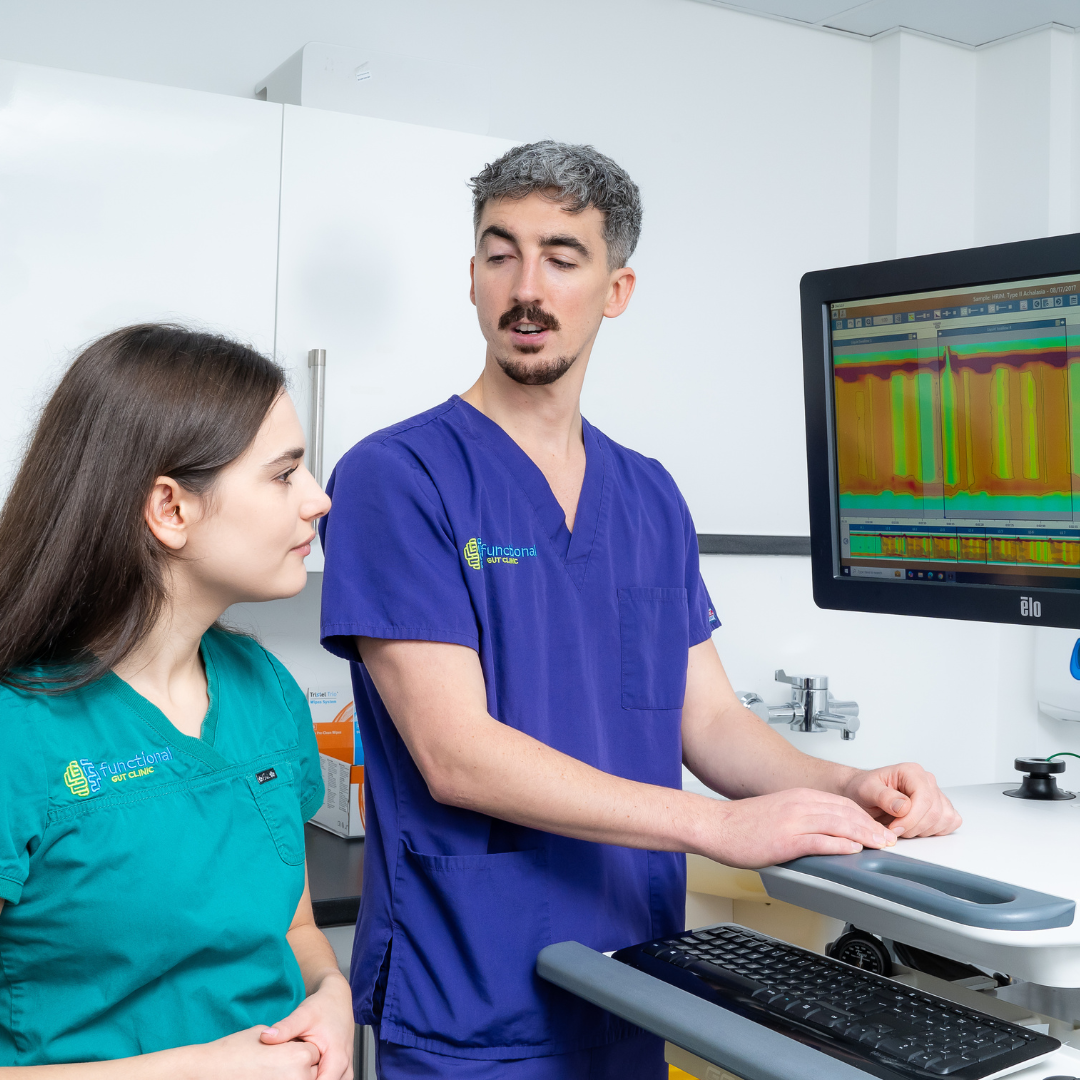Bloating
Struggling with bloating? Here’s what you need to know to find relief.
ALL TEST ARE ACCREDITED & REGULATED BY



What is bloating?
When you’re bloated, your stomach or abdomen can feel full and uncomfortable, or even painful.
This bloating happens when your gastrointestinal tract contains too much gas or air. Bloating can be mild, or more severe, and may present as:
– A visibly distended or swollen abdomen
– Feeling very full and uncomfortable
– Feeling of tightness in the abdomen
– Excess gas – belching and/or flatulence
– Rumbling or gurgling
There are several causes of bloating, so it’s important to diagnose the cause of your bloating and find out why it’s happening to you.

Why does bloating happen?
Prolonged periods of bloating could indicate an underlying health problem, if so you should see your GP.
Possible causes can include:
Irritable bowel syndrome (IBS diagnosis)
Ulcerative colitis, a form of inflammatory bowel disease (IBD), where the inner lining of the large bowel is inflamed and develops ulcers
Crohn’s disease, the other form of IBD, where some parts of your colon are inflamed
Too much bacteria in your small intestine (called small intestinal bacterial overgrowth, or SIBO)
Gastroesophageal reflux disease
Food intolerances, especially lactose or fructose intolerance
Producing too much gas (dysbiosis and fermentation)
Weight gain
Stress or anxiety
Delays in your food and drink moving on from your stomach (called gastroparesis)
Eating too quickly, so that you swallow too much air (called aerophagia)


Diagnosing bloating
Feeling bloated is no fun, but once you know what’s going on you can start to manage your symptoms and the underlying causes.
Testing options:
At the Functional Gut Clinic, we can run the following tests to diagnose the causes of bloating:
Gastric emptying test– which measures how quickly food leaves your stomach
Carbohydrate malabsorption breath test– which finds out if you have certain food intolerances (lactose or fructose)
Small intestinal bacterial overgrowth (SIBO) breath test– which finds out if you have an overgrowth of bacteria in your small intestine (called SIBO)
Oesophageal manometry– which measures the function of your oesophagus (food pipe)
24-hour pH impedance monitoring– which looks at whether you have any reflux
Colonic transit study-a non-invasive test which looks at how long it takes for faeces to pass through your bowl
Learn more about bloating

Why Exercise Is Good for Your Digestive System
Millions of people struggle with digestive problems like bloating, constipation, and acid reflux. Often, people turn to medications and dietary changes to remedy the issue. However, physical exercise is increasingly recognised as an effective way to support your digestive system.
Exercise isn’t just about building physical fitness or shedding extra pounds. Just a few hours of exercise per week can leave you fitter, happier, and digestively healthier than before. You’ll might also even experience fewer digestive and regurgitation symptoms.
But why is exercise good for your digestive system? And what exercises help to improve digestion? Find out below.
Why Exercise Is Good for Your Digestive System
In the modern world, we spend too much time eating poor quality food and sitting in a sedentary position. The result? Our digestive systems move at a glacial pace, causing all kinds of problems.
Exercise gets the blood pumping and gut moving. Simply jogging, lifting weights, doing yoga, or any other kind of exercise stimulates the digestive tract and speeds up transit times. Part of the mechanism is increased blood flow to the gut. This helps with nutrient absorption, ensuring you get everything you need from your diet.
In a 2020 study, obese patients were put on a sports training program. After 12 weeks, the training group saw improvements in cardiac and digestive markers, indicating that even simple exercises can reduce the risk of digestive diseases.
Exercise Improves Mood — and That Helps Your Diet Too
It’s not just about how exercise affects your gut physically. It also changes the way you think, eat, and feel.
Routine exercise boosts endorphins and serotonin — the brain’s feel-good chemicals. That lifts your spirits and increases your motivation. People who exercise consistently are (unsurprisingly) more likely to eat nutritious, unprocessed foods, lowering the risk for indigestion, acid reflux, and constipation.
What Exercises Help to Improve Digestion
People often assume that exercise means a gruelling 10-mile run or an intense weightlifting session. Those are great. However, you can still see results from more gentle exercises.
Try these options:
Walking After Meals. Going for a gentle stroll after a meal is one of the easiest and most effective ways to improve digestion. It’ll trigger your body’s natural gut motility, helping you to digest your food.
Yoga. All those twisting postures and rapid changes between poses help massage the digestive organs and get your blood pumping. Poses like Seated Twist, Cat-Cow, and Child’s Pose are particularly helpful.
Cycling and Swimming. Low-impact cardio like cycling and swimming is excellent for your gut. Cycling, in particular, targets your core muscles — even a 20–30-minute ride can make a big difference. Swimming helps boost circulation and stimulate the gut. The horizontal position can also relieve pressure on the abdomen.
Pilates and Core Workouts. If you want to directly target your core muscles, do it. It’ll improve posture and abdominal tone. That can help with digestive issues like bloating.
Tai Chi and Qigong. For older adults, it might not be possible to do most exercises. These options involve slow, flowing movements that are great for individuals with chronic digestive problems.
Long-Term Benefits for Digestive Health
Exercise isn’t a quick fix. While you’ll notice some tangible improvements within the first few weeks, the real benefits are long-term. Staying fit and healthy means disease prevention.
You’ll see a significant drop in constipation, bloating, and sluggish digestion after a few weeks or months. The more exercise you do (and the healthier you eat), the greater the benefits. Most people experience a complete transformation in their bowel habits.
It can also reduce your risk of digestive conditions, such as IBS, GERD, and diverticulitis, by promoting a healthier weight, enhancing gut motility, and fostering a more beneficial gut microbiome. Regular movement may also help reduce low-grade inflammation throughout the digestive tract. And for those with stress-related gut issues, exercise can play a key role in breaking the cycle of tension and flare-ups.
When to Be Cautious
You still need to be careful though. High-intensity workouts can worsen some cases of reflux and IBS — especially if you’re increasing abdominal pressure. Listen to your body, avoid intense movements directly after eating, and always stay hydrated.
If your symptoms persist despite making lifestyle changes, it’s worth consulting with a doctor. Look out for regurgitation symptoms, sudden weight loss, and blood in your vomit or stool.
The Functional Gut Clinic offers specialist advice and testing for people with persistent digestive issues. If you’ve got long-term reflux or regurgitation symptoms, we can help you find an answer.
Visit our regurgitation symptoms page to learn more.
Hear from people we’ve helped, just like you.
"Very professional while welcoming and friendly"
"The manner and demeanour of all staff from reception to people carrying out the test was very professional but welcoming and friendly. Atmosphere is very relaxed and all instructions clear and concise."
London Patient

"Highly recommend this"
"Thanks to Dr Hobson and everyone at the Functional Gut Clinic. The whole team is very kind and generous and they are doing things that are cutting edge and they actually get results."
Manchester Patient

"Highly recommend this"
"After stopping my lansoprazole, every time I had a warm drink, I could feel it burn all the way down to my stomach. Thank you to Sam for making me feel at ease." - Manchester Patient

"My experience could not be better"
"Pleasant and knowledgeable staff that made the experience more enjoyable than it should be!" - London Patient

"Very friendly and knowledgeable"
"An excellent service from beginning to end. I would recommend to anyone who was considering having testing done. Very friendly and knowledgeable!" - Manchester Patient

"Very kind and helpful"
"It was also great to have time to talk to the clinicians – very important when you have problems. Reception staff also very kind and helpful." - Manchester Patient

Are you experiencing any other symptoms
Symptoms are often closely connected. Find out more below.
Reflux

Burning mid-chest, worse when bending or lying down
Constipation

Difficulty going to the toilet, unusual stools, often with stomach ache or intestinal cramps, bloating, nausea or appetite loss
Heartburn

A burning pain in your chest, just behind your breastbone.
The pain is often worse after eating...
Regurgitation

Bringing food or drink back up, difficulty swallowing, feeling that food or drink is stuck in your throat, horrible taste in your mouth
Swallowing Issues

Dysphagia - difficulty swallowing, feeling that food or drink is stuck in your throat, horrible taste in your mouth
Diarrhoea

Loose or explosive stools, can’t get to a toilet in time
Abdominal Pain

Cramps; sharp or dull pain, Bloating, Excessive belching, Nausea or vomiting
Faecal Incontinence

Stools leak unexpectedly, Can’t get to a toilet in time
IBS

Abdominal pain or cramping, bloating, changes in bowel habits and urgency, gas

